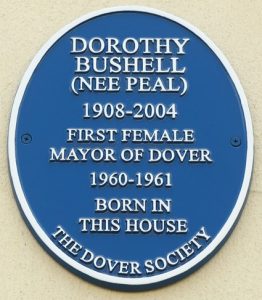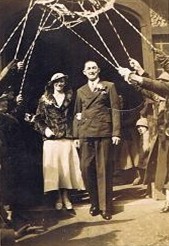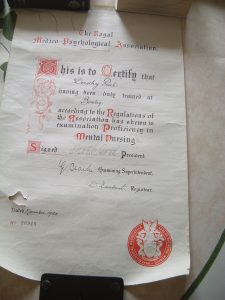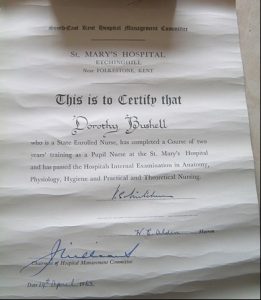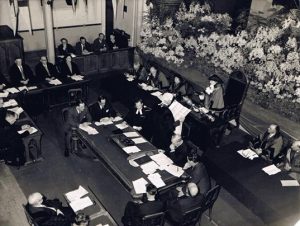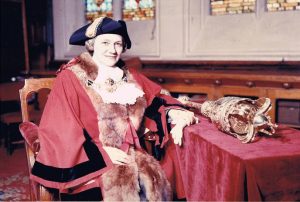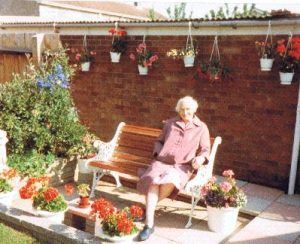Dorothy Bushell was born in Dover in 1908 at 45 Wyndham Road, the daughter of Mr and Mrs Henry Peal. She was one of eleven children and was to become the longest-lived, eventually dying in 2004 from a heart attack while resident in Alandale residential home in Whitfield at the good age of 95. The cremation took place at Barham, near Canterbury, at 4pm on Wednesday, July 21.
She attended school locally, but it appears she did not stay at school, being required to look after her siblings and become engaged in service. In 1920, Dorothy was just 12 years of age, when her father died after an appendectomy operation. Her mother died, aged 75, from a brain tumour when Dorothy was 43, by which time she was married to Edmund Bushell MBE. Born in Peter Street, Dover in 1903 he was a great grandson of the parish clerk of Dover and was made a freeman of the town by birthright on 3rd July 1931. Apprenticed with Flashman and Co. he became a French polisher for Southern Railway working on the wooden fittings of the ferries and Lord Warden Hotel. He was to become a charge hand painter for British Railways. From 1935, representing the Labour Party, he became a Dover Borough Councillor and an Alderman in 1945. He was awarded the MBE for his work as chairman of the local employment committee from 1945. Elected Mayor in 1964 he died, while in office, at home in 1 Churchill Road on 27th January 1965. He and Dorothy had been married three months short of thirty years.
Edmund Alfred Bushell and Dorothy Peal were married in the Wesley Hall, St Martin’s Hill, Folkestone Road, Dover on 17th April 1935. On the marriage certificate he was described as French Polisher (Railways) and she as a Nurse, Mental Hospital, resident at St Augustine’s Chartham. They were destined not to have any children, and she was to be a widow for nearly as long as her married life with her husband.
Dorothy entered the nursing profession in 1930 when she became a Registered Mental Nurse undertaking additional training in the Royal Victoria Hospital, Folkestone. She served time as a theatre nurse during the Second World War having volunteered in 1938 and being called up in 1939. On duty when the first injured soldiers arrived from Dunkirk, she ministered in a ward for Dutch, French and Belgian soldiers. She eventually went off duty at 2.30am and returned at 8am and repeated this commitment for the subsequent days of the Dunkirk emergency working alongside, among others, the surgeon Dr Gertrude Toland. It is said she once had to saw off a finger from an amputated arm to enable a soldier’s wedding ring to be returned to him. She became a State Enrolled Nurse in 1963.
During the latter part of the war years, she was co-opted onto the Borough Council as a councillor for St Bartholomew’s Ward and was subsequently elected in 1947. Her specific interests were the post war reconstruction of Dover and health issues for the poor and underprivileged. She was Chairman of Dover’s Maternity and Child Welfare Committee and a keen supporter of the introduction of orange juice and dried milk for children and expectant mothers. She broke the mould of a male-only preserve when, on 23rd May 1960, she was elected the first woman Mayor of Dover in over 900 years, enabling many other women to follow her example. Her Mayoral year coincided with the Speakership of the Cinque Ports vesting in Dover and it is believed she was only the second woman Speaker. She was the 302nd Mayor of our town and only the third Labour or Socialist Mayor. In 1957 she had been elected as the second female Alderman and by the time she was elected Mayor she had served two years as Deputy Mayor. She was also to represent Dover North on Kent County Council for three years and was deeply committed to the life and community of Dover.
She followed Alderman Eckhoff as Mayor. Conscious of breaking the all male tradition in her Mayoral speech she said “Dover is a progressive town moving with the times” adding “The town of Dover has made history today, but it is making history all the time in the sort of town it has become even since the war and in the services it provides for its people”. She expressed concerns over redundancies in the mines and on the railways adding, “The redevelopment of Dover has at last speeded up…!” [Judging by its state today the pace of development prior to her Mayoral year must have been very very slow!] As Chairman of the Housing Committee, she recognised that housing was a problem and expressed concern over high interest rates. About 25% to 30% of all rented property in the town was organised by Dover Borough Council who indicated they were looking for properties for conversion and rebuilding on blitzed sites. She added, “Of all the improvements we would like to see in the town a swimming bath is most often mentioned. In giving this our full support we are well aware that it is all of us, as ratepayers, who must “will the means” for it to be a lasting project. However, the benefit of many things cannot be measured in terms of money. The decisions will have to be made with courage and, I believe, during this civic year”.
What year it turned out to be! It was so successful that at the annual meeting on 23rd May 1961 it was unanimously ordered that the Council place on record its appreciation of the outstanding services “rendered by Alderman Mrs Dorothy Bushell in the office of Mayor to which she was elected on 23rd May 1960” and that the record of appreciation be “illuminated on vellum in book form for the ex-Mayor’s acceptance”.
The tribute recorded highlights of her year beginning thus: “Alderman Mrs Bushell has enjoyed the unique distinction of being the first woman to occupy the office of Mayor in all the long history of Dover, added to which, during the greater part of her year of office, Alderman Mrs Bushell has held the no less exalted office of Speaker of the Confederation of the Cinque Ports. Alderman Mrs Bushell has discharged her many duties with consummate ability and infinite grace and charm thereby fulfilling the high expectations not only of her colleagues on the Council but also of her multitude of friends in Dover and beyond.” Events recorded included: Opening of King Charles II Walk, on 25th May 1960, by the Lord Cornwallis to mark the tercentenary of the arrival at Dover of King Charles II on the occasion of the Restoration in 1660. The consecration, on 27th May 1960, by His Grace the Lord Archbishop of Canterbury of the Church of St Nicholas on the Buckland Estate. The presentation of new colours to the 5th Battalion The Buffs by the Colonel in Chief, King Frederick IX of Denmark and a visit to Dover by HRH The Duke of Gloucester. The visit of the President of the District of Split, Yugoslavia and the goodwill visit in return. The civic tribute ended “in recording its unqualified gratitude for services splendidly performed the Council extends to the Ex-Mayor and to Alderman E. A. Bushell its best wishes for long life, good health and continued happiness together”. Sadly, within a period of just over three years Mrs Bushell was to find herself a widow.
In the context of those plaudits how did the ex-Mayor approach her year in office?
In her “Random recollections of my “year” May 23rd 1960 to May 23rd 1961” she wrote – “The Day 5.30pm on a warm evening. Edmund and I walking down to the bus stop at Elms Vale corner to take the bus to the Town Hall much the same as we have done for the last 15 years together, only this time I was wearing a new green and white tricel two piece and a special hair do for the occasion. Arriving at the Town Hall we robed and at 6pm promptly we filed into the Connaught Hall to take our places, facing the general public seats, with all the chairs and desks arranged as in the Council Chamber, the Mayor’s chair in the centre on a plinth, and behind us the platform massed with the most beautiful array of flowers I have ever seen; the perfume almost overwhelming and the colours blending beautifully. The first item being “To elect a Mayor for the ensuing year”. I sat there quite detached while my nomination was proposed by Alderman Mrs Coatsworth and Alderman Snelgrove in somewhat glowing terms. I found myself moving off behind the Mayor to the robing room, dressed by the Town Sergeant in all the Mayoral regalia, the cravat feeling the most strange, the new hat slightly uncomfortable, mostly on account of it not being paid for yet (cost £8/18/6d) and then re-entering the hall to meet a sudden blaze of light. I paused, this moment of history was being filmed in colour, then proceeded to the Mayoral Chair and took my seat.
Rising to take the oath and signing the long scroll of parchment in a hushed silence, was for me a most solemn and moving moment, then calling upon the Rev’d S. Roberts for the prayers, giving my speech, standing there in a blaze of light to about 500 people, apart from the Council, was an ordeal, which, however, was not obvious since someone said to me afterwards “as if you had been doing it all your life”! the burst of applause at the end of it, and then looking down the agenda and quite suddenly feeling everything was going smoothly, and it was alright………….the business proceeded without error and finally we went out to disrobe and on such a warm evening I was indeed glad to shed the fur trimmed cloak and the hat………..Edmund was pleased and proud. The weight of the chain felt for the first time through the thin silk was an ever-present reminder of my responsibility. Could I, ordinary Mrs Bushell, the very first woman Mayor of Dover in almost 900 years of recorded history, measure up to the standard set by my predecessors? What amount of support would I get? Would I be able to stand the pace so soon after a major op? Only time could answer all these doubts which beset me, once it was a fait accompli; but I am determined to do my best and I pray constantly for wisdom to know what is right and the courage to carry it out”
By New Year’s Eve she was writing “Of all the things I hope to achieve this year one is to leave the office of Mayor with the dignity I hoped to acquire when accepting it and to have made it possible for other women to be so honoured.” On New Year’s Day her entry reads “New Year’s Day and a lovely sunny one, we robed at the Town Hall and proceeded on foot to St Mary’s Church where the Rev Hewlett Johnson (the Red Dean) was the guest preacher. I read the second lesson…We attended St Andrew’s Church for lessons and carols in the evening. I love this service but the church was so gloomy and cold I was glad to get home.”
Her log of events following is a fascinating personal insight into the workload of the Mayor and her reactions to events. For instance on 5th January she wrote, “Reception for 56 guests before the Panto of Dick Whittington, quite good, but I loathe those front seats! One might as well be on the stage.”
On the 24th February she was in Court “11am Court, where a smuggling case enlivened the proceedings, 4,223 watches and 5 pieces of jewellery were involved value £41,000! Depositions took until 5.30pm, almost a “cloak and dagger” epic was unfolded, involving a 500 mile journey through the night, an interlude in Paris and capture at Dover with the loot, which had been ingeniously concealed in the heating system of the car. I think the woman will get off, I believe she is just a tool in the game. The courtroom looked like Aladdin’s cave with all the samples about. We sent them to Kent Assizes”. [She recorded later in March “Mr Leppard told me the woman in the smuggling case has been discharged not guilty”]
In April on Easter Sunday she records “Church, it was so packed that I could hardly find a seat my usual one being taken…….I did not know whether we were supposed to put extra in our envelopes and anyway I had last week’s as well so I didn’t though I have always made Easter one of the special ones”
At an event on 8th April the host “said he did not quite know how to address the Mayor’s husband since she was “Mr Mayor” and to our surprise Edmund said in a stage whisper “call me Madam” which came out so unexpectedly we all laughed”
On Wednesday 12th April she recorded “1st spaceman went into orbit. Radio announced that a Russian Yuri Gagarin had returned safely”
She records calls for her to fight in the elections for Town and Pier Ward which she rejected and made comment about an anonymous letter and articles in the press that had poisoned the atmosphere for her. From her journal and comments in it one is left with the impression of a determined lady who was unafraid to speak her mind even to the extent of rebuking her own husband and another councillor in committee. Such directness may not have endeared her to some of her Council colleagues and others!
Then, on 17th April, she records “My 26th Wedding Anniversary and Edmund shamed me by remembering it and I didn’t!” On 23rd April she officiated at the Zeebrugge Day service attended by Lady Keyes, her son Lord Keyes and her grandson the Hon Charles”. She rang the eight bells on the Zeebrugge bell.
Her record is a testament to the commitment and industry she gave to the Mayoral Year and contains all manner of interesting thoughts and memories. April 30th was when she set off with her husband and the Town Clerk to visit Split, leaving Dover on the ‘King Albert’ to sail to Ostend and then take a train on a very long and not too easy journey to Zagreb arriving at midnight a day later. Her journal ends on 4th May some three weeks or so before relinquishing the Mayoralty on 23rd May 1961. Her year had been an outstanding success and her journal reminds us of the personality behind the official façade. She was a Christian lady who approached the office of Mayor with apprehension but acquitted herself with distinction.
She continued to live in Churchill Road for a while after her husband died then moved to Park Street, then Snelgrove House before a residential home in Herne Bay. This was not the end of her travels for she then went to Abbeyfield in Walmer before asserting her independence and moving to a flat in St Margaret’s at Cliffe but ending her days in Alandale in Whitfield where she died. She did, however, during the Mayoral year of Diane Smallwood, come down into town and watch the switching on of the Christmas lights in the Market Square by sitting with the Mayor in Dickens Corner and following events from behind the window of that café.
She was a very clever lady, developing much of her learning late in life, was also an active member of the Methodist chapel and a fluent French speaker. While she learned how to swim in her 60s she never drove a car. She shone at poetry, obtaining a merit award in America in 1999 for one of her poems from1980, “Lexically Speaking”, and having published a recollection from the ‘England of yesteryear’ entitled “The Real Father Christmas”. As she approached the end of her life she was still providing samples of poetry:-
Samphire Hoe
I marvel that the mind man
Dared to emulate the Creator
Devising a landscape in the sea
The cliffs arising from its base
Protected now from the sea’s embrace
How strange that we now can walk
Where no foot trod before
On the Channel Tunnel’s elemental chalk
Dorothy Bushell, a Mayor to remember and in whom the town should have considerable pride, led the way for subsequent female Mayors.
Thanks to Fr Peter Sherred for his research and original article.


